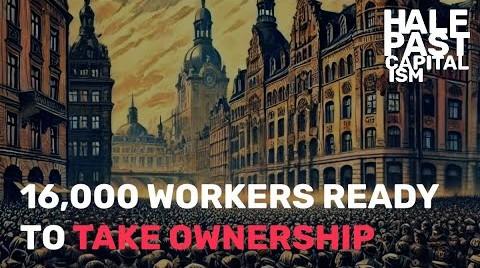
An Interview with Shannon Ikebe
There's a lot to learn from Sweden's Meidner Plan, which would have phased in worker ownership of most of the economy over 30 years. As a followup to our episode with Joe Guinan, Dru Oja Jay spoke to Shannon Ikebe about some of the new archival materials about the Meidner plan, and insights it contains for current efforts to plan beyond capitalism.
Read Shannon's dissertation on Sweden's wage earner funds here.
Abstract
This dissertation analyzes politics of the Wage-Earner Funds (WEF) in Sweden in the 1970s and 1980s. Rudolf Meidner and Anna Hedborg, researchers for the powerful Social Democratic union confederation LO, first proposed the WEF plan in 1975, which would mandate an obligatory annual transfer of new corporate shares into union-owned funds. According to their plan, the Wage-Earner Funds would eventually gain majority ownership of firms constituting much of the Swedish economy within a few decades, radically transforming the capitalist relations of production. This plan, which I call the Meidner-Hedborg Plan (MHP), was among the most extensive program for a socialist transformation proposed in an advanced capitalist society in the 1970s, the last period in which legitimacy of capitalism was seriously challenged.
Even though the Meidner-Hedborg Plan was adopted by the LO Congress in 1976, its radical aspects were soon attenuated and removed in the negotiations between the LO and the Social Democratic Party (SAP) leadership. The conventional narrative suggests that intense business mobilizations against the Wage-Earner Funds decisively undermined its transformative potential. However, a careful analysis of archival materials demonstrates that most of the capitalist anti-Fund campaigns occurred after the MHP had already been deprived of its transformative character and replaced by other moderate versions of the Wage-Earner Funds. I demonstrate that the cause of the Meidner-Hedborg Plan’s defeat was the Social Democratic Party leadership’s staunch refusal to support it, combined with the weakness of mobilizations for the plan.
The structural root of these factors is the hierarchical and hegemonic character of Swedish Social Democracy. The party leaders rejected the MHP, since they embraced the capitalist “mixed economy” upon which they had built the welfare state. Social Democratic militants strongly supported the Meidner-Hedborg Plan, but could not organize for it in defiance of the leadership, because of the weakness of autonomous structure and culture to empower an organized internal dissent. Furthermore, certain institutional features of the plan, as well as the ambiguous, polysemic character of the discourse of “economic democracy”, made it challenging to concretely articulate how the society and workers’ lives would be transformed under labor control of firms.
As the Meidner-Hedborg Plan was defeated internally, the Wage-Earner Funds were completely re-interpreted by the SAP leadership around Kjell-Olof Feldt, as a tool to secure increased capital formation while minimizing class conflicts. The new version of the Wage-Earner Funds, which I call the Feldt Plan, was congruent with the neoliberal turn of the SAP leadership in the early 1980s. The Swedish Parliament finally enacted the Wage-Earner Funds in 1983, based on the modified version of the Feldt Plan. But it had a very limited impact on the Swedish economy and society during their seven years of operation.
The Meidner-Hedborg Plan was the most paradigmatic, ideal-typical example of the social democratic path to socialism. Based on an analysis of this critical case, I posit that contradictions of social democracy are rooted in containment of autonomous rank-and-file movements. The case of the Wage-Earner Funds in Sweden highlights the vital importance of internal democracy in struggles for an emancipatory society, not only as a matter of principle, but also as a question of strategy.

Add new comment